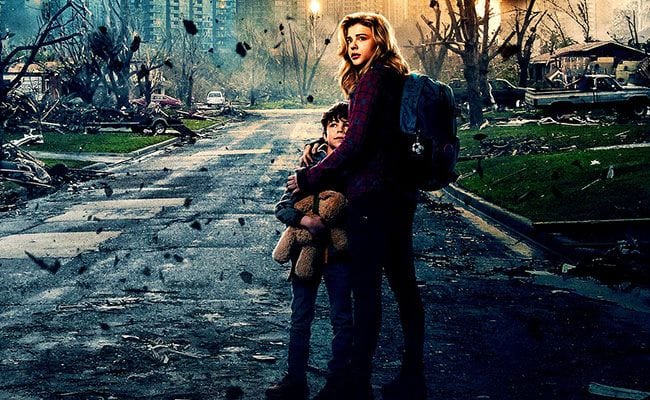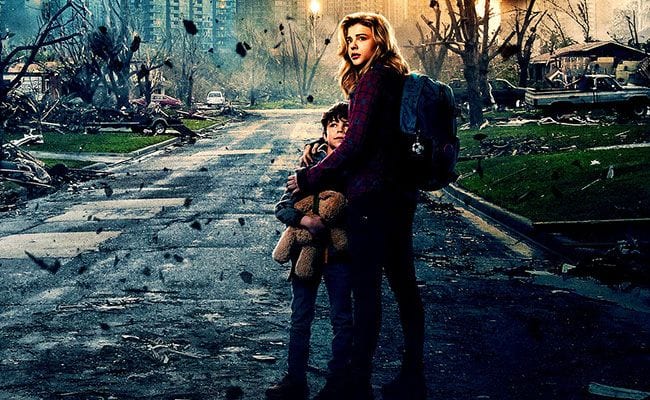
“I miss the Cassie I was,” laments the Cassie that is at the start of The 5th Wave. The present Cassie (Chloë Grace Moretz) has just killed someone (Matthew Zuk), identified only as “Wounded Man with Crucifix”. This young man appears in Cassie’s nightmare of a new life in order to lay down the Major Theme, namely, that she wants to recover her “humanity”.
It’s a big idea for a young adult story, and so the plot makes plain the difference between human and not human, even if it still fudges the less definable “ity” part. For Cassie now, post-alien invasion (yes, there is one, per the YA manual, killing humans means being not quite human. And being human means being her old self, the “totally normal high school girl” who played on the soccer team, had a best friend of color (Gabriela Lopez), and flirted with a football star named Ben (Nick Robertson).
The crisis posed by Wounded Man with Crucifix is striking, of course, symbolic in every way possible. He’s wounded and bleeding in a shadowy corner of a convenience store, he’s asking for her help, and he’s pulling his hand from beneath his jacket — the hand holding the crucifix — when she shoots him. It’s a mistake, which in itself might be a sign of Cassie’s “humanity”. It’s also a device to send her back in time, so she can tell you how she came to be this new Cassie, the one she suggests the old Cassie wouldn’t have “liked”, a child who kills out of fear, a fear based on appearances that are increasingly un-readable.
All this makes Cassie a familiar sort of YA hero. Confused yet uncannily skilled when she needs to be (she’s only first picked up a gun, a Colt .45 given her by her dad, a couple of days before this kill shot), fearful yet courageous, childish but conveniently occasionally mature. Cassie’s version of herself — the one she narrates in that YA way, per a journal in which she jots notes as you watch over her shoulder — poses a few questions, is thoughtful and naïve, courageous and awkward, sometimes whiny.
And yes, her trajectory is determined by the men and boys around her. When she kills Wounded Man with Crucifix, Cassie is by herself, but she’s about to be rescued by Evan (Alex Roe).
Before you can say “Katniss Everdeen“, Cassie’s caught up in a triangle she doesn’t see yet, her feelings for Ben complicated by her assumption that he’s dead like everyone else she knew in high school and her feelings for Evan are just complicated. That she checks out his muscular torso while he’s chopping wood or bathing might remind you a bit of of Bella too, so desiring, so desirable. Her shy glance away makes her endearing, even as she’s almost lusting.
Based on Rick Yancey’s popular 2013 novel, The 5th Wave continues to check the YA boxes. Loss of home and parents, check. Beloved sibling, check. Sketchy adult authority figures, check. That one of those adults is Sergeant Reznik (Maria Bello) exemplifies the film’s cartoonish characterizations and identity politics. Affiliated with another bad adult, Colonel Vosch (Liev Schreiber), Reznik’s sinister bent is marked from the start by her red lipstick and cakiest powder this side of Effie Trinket. Insisting that Ben be a good soldier, that his survival of the first few waves of the Others’ invasion is a sign that he’s equipped, she convinces him to lead a squad of children to kill Others. No one ever said YA was subtle.
The most obvious idea here is that kids can be manipulated into any sort of awful behavior, including murder. Kids who read YA novels or watch YA movies hear this a lot, so you’d think they’d be wary of adults, but maybe in Cassie’s Ohio, she didn’t have access to Amazon or a local bookstore. This manipulation is made material in Reznik’s insertion of trackers, little slivers of tech, into the backs of the kids’ necks, by way of a gun that resembles an ear-piercer and very close shots of the angry raw-red spots produced on a couple of pale white children’s napes.
Ben’s recruitment underlines that his once “pretty smile” is now transformed, so he’s nicknamed “Zombie”. His squad includes a black kid (Nadji Jeter), a little white girl in need of looking after (Talitha Bateman), and a hard-ass gothish-punkish-super-tough-choose-your-adjective girl named Ringer (Maika Monroe), who teaches the rest of the kids how to shoot. It’s helpful, too, that Ben’s squad includes Cassie’s missing little brother Sam (Zackary Arthur), partly motivating the clumsy cuts between Ben’s experience and Cassie’s.
This manipulation is also the foundation of most militaries, a point the film slams home with Vosch rousing his baby-faced troops to feel heroic and patriotic. As the kids nod and glower, determined to save the planet from Others and take revenge for their dead parents, you see low angle close-ups of his sneery face. YA movie viewers will recognize this trick, too, and know that even as children head down their immoral roads, they will be saved.
Cassie doesn’t see this, being the one who will save them and also, at the moment, on the road and distracted by Evan. She’s determined to rescue Sam, whom she assumes is alive against considerable odds — because that’s what YA heroes do. Much like her predecessors, Cassie is embarked on a mission premised on redemption, her own and also that of the human race. That too ordinary tall order means the movie is in a perpetual quandary, ever predictable and ever rushing to fill in its episodes, full of too much information and never enough. The kids are cutouts, their plots are schematic, and their dialogue is unconvincing.
Does any of this matter? Does anyone care that the film is based on formula, or that its comedy is inadvertent, or that it’s inelegant from the beginning? Probably not. This is the most distressing thing about YA. As much as YA movies tout optimism for children’s futures, celebrates their resilience and individuality, the genre is all about their young audience’s manipulation and capitulation. These recruits don’t even need to have trackers in their necks.

